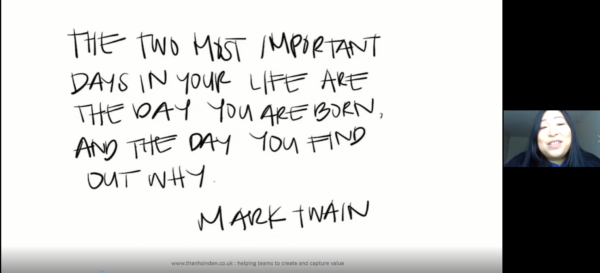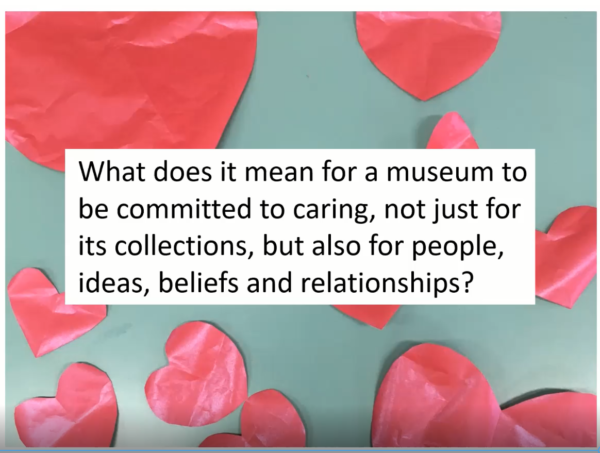Good Work: How might we re-think our work and our working relationships for good?
This No Going Back conversation took place at a time of many emergencies and injustices beyond the pandemic itself – the climate emergency; biodiversity loss; social inequality; systemic racism; radicalization and extremism. In the words of Dr Toullah Oni, how could ‘back to normal’ be an aspiration, or desirable, ‘when normal was not ok to start with for so many people’? How might we use this time ‘to reflect on the unjust aspects of society that we have condoned, directly or indirectly, up to now’? (Independent Sage, 18 December 2020)
For many of us, work entered or insinuated itself into our homes and blurred the boundaries between ‘professional’ and ‘personal’. At the same time, the shock and losses of the pandemic and multiple crises heightened a sense of what we truly care about. These, together, may have led us to ask: what are we doing, and why? How does our work fulfil our personal values and priorities, and our wider aspirations for a more just and tolerant society in which people, place and planet prosper?
We also learned that we have a huge capacity to embrace change and to come together to explore and forge new possibilities and new ways of being. In this session, we sought to explore these questions and new possibilities. Throughout the session, we invited people to use the principles of the Thinking Environment – a deeply human approach in which we treat others as we would wish to be treated ourselves. (www.timetothink.com )
Thanh Sinden spoke of the connection between purpose and wellbeing:
‘When we have a purpose, we experience the awe of being part of something much larger than ourselves; we make a deeper connection with the world around us and we spend less time being self absorbed, which increases our wellbeing.‘
Thanh encouraged us to find our purpose: to consider our passion and our talent, but also to ask: ‘What makes me angry? What am I curious to change? What do I want to improve or make better?’ She asked: how we might pursue our purpose, bringing purpose into every day, setting intentions and taking steps with small, granular things as well as bigger, bolder actions.

We then watched the first part of Monica Montgomery’s TED talk, ‘How to be an upstander’. She described the events that brought her clarity about her passion and purpose, and the bold actions which she took, then offered a provocation: ‘That was my turning point – what is yours going to be?’ (to 5 mins 58 seconds)
Participants moved into smaller groups to think about: Why are you doing what you are doing? How does your work fulfil your purpose?
I loved the way our conversation reminded me of why I do this, one reason being the people I meet and work with in museums. Hearing others share their motivations and purpose in such positive and friendly ways gave me a boost after too much time alone at my kitchen table 🙂
….[we need to] re-evaluate to ensure that everything we are bringing forward does actually meet our purpose(s).. and that re-evaluation process should be repeated and ongoing. This also keeps us relevant and adaptable… as long-term planning can sometimes be incredibly inflexible.
In the second part of the session, Jo Hunter, founder and CEO of 64 Million Artists, and Hannah Lee-Chalk at Manchester Museum addressed the question: How might we change our work and our working relationships for good?
64 Million Artists is a social enterprise which believes that everyone is creative and that when we are creative we can make change in our lives and in the world around us. Pre-Covid, the company relied almost entirely on earned income, ‘working on other people’s agendas… living our agenda in other people’s places’. When Covid struck, Jo secured a loan and embarked with the team on several changes. They reflected on their values and purpose: what do we want to do? Who do we want to be..? Who could we work with that we’re not already working with? How could we work? How can we take care of each other during these times? At the same time, they experimented with low risk projects in new areas: a programme of daily challenges, Create to Connect, in partnership with other organisations locally and nationally; and facilitation courses, using the expertise they had developed. Each week, each person in the team had a conversation with someone they didn’t know and were interested to meet: this expanded and diversified their pool of associates. The company has adopted a 4 day working week on full pay for all team members, as a permanent commitment to support wellbeing.
As a result of all these, 64 Million Artists has changed how they work; recruited two additional members of staff; and almost doubled their turnover, despite turning down substantial offers of work. For Jo herself, the experience has confirmed that relationships are key, both externally and within the team –contributing to a sense of wellbeing and resilience.
Hannah described Manchester Museum’s principle of care, for people as well as for collections: ‘beyond care as preservation and protection to a more generative type of care that’s led by emotions and focuses on nurturing and flourishing’. The Museum has embraced a commitment to care as a collective, organic and ongoing process. In workshops, staff and freelancers asked: what might a caring museum look and feel like, for those who work with and for it? What do people need in order to flourish? Staff wellbeing and resilience are embedded in the Museum’s transformation and capital project. This ‘generative care’ also extends to the collections: caring about their health and wellbeing, and caring for people, relationships, ideas and beliefs as well as the physical integrity of collections. This has led the Museum to confront some of the legacy of our colonial heritage in its collections and to embark on a journey of reconciliation and healing.

Participants then gathered in smaller groups to consider what version of work they might want to create for themselves; and how might they re-think their work and working relationships for good – for themselves, and with colleagues?
Towards the end of the end of the session, we invited people to think about what action they would take to build on what they learned in the session; how they might keep hold of their intention; and how they might make space and time to think with others about the things that really matter.
Thank you so much for such a vital session, a great way to move into a new year. Also, so much love for Manchester’s staff room!
So inspirational, thank you!
You can watch a recording of the session below – and other conversations in our No Going Back Conversation series.

